When Can Babies Start Drinking Water? (Plus, the Best Water for Baby Formula)
If you are parenting a newborn or eagerly awaiting the moment your ‘Bundle of Joy’ arrives, deciding how to feed them is likely a top priority for you. As you probably know, breastfeeding, formula feeding, or a mixture of both provides all the nourishment and hydration your baby needs for the first couple of months. But perhaps you aren’t sure when it will be safe to start giving your baby water, how much water they can have, how to offer the water, and what kind of water they should drink. If that’s the case, we’ve got the scoop.
When Can Your Baby Start Having Water?
According to HealthyChildren.org, the sweet spot for introducing your little one to water is after they celebrate six months of age when you start introducing pureed solids. While you can begin to feed solid food between four and six months, experts recommend waiting until your baby is older than six months to offer water, assuming they are growing and gaining appropriately.
But even then, your baby’s primary source of hydration should continue to be breast milk, infant formula, or both, at least until after 12 months. “From six to 12 months, water is really just practice (think a few sips here and there) as babies are also getting used to a sippy cup or any cup other than a bottle or breast,” said Deborah Malkoff-Cohen, MS, RD, CDN, CDE, a pediatric dietitian, in an interview. “The goal is to get your kiddo accustomed to drinking water,” Malkoff-Cohen added.
Also, understand that most babies won’t like the taste of plain water and may still prefer milk or formula. Some might only take a few sips because they don’t necessarily need it, while others may refuse to drink it and make a face, especially if they were expecting something else. Don’t worry; this will change!
By 12 months old, your baby – who is now a toddler (they grow up so fast, don’t they?) – can have more water as they want it, cow’s milk, and a nutritious diet. “It’s one of the healthiest habits to start early,” says California-based pediatrician Tanya Altmann, MD, author of What To Feed Your Baby.
The Risks of Giving Your Baby Water Too Soon
There are a couple of reasons you should wait until the recommended six months to introduce your baby to water. In most cases, babies under six months old don’t need the extra hydration that water would provide because nutrient-rich breast milk or formula meets all their hydration needs. However, there are several more harmful risks involving feeding your baby water too soon:
- Water intoxication. Feeding your baby water too early can cause the baby’s kidneys to flush out vital sodium and electrolytes, leaving the baby salt-depleted and causing an imbalance in an infant’s electrolytes, according to org. “Until the age of six months, a baby’s kidneys are too immature to correctly filter plain water, leaving the baby susceptible to water intoxication,” says Natasha Burgert, MD, FAAP, a pediatrician in Kansas City, MO, and author of KCKidsDoc.com. Water intoxication may result in symptoms like seizures, low body temperature (below 97 degrees), drowsiness, irritability, and swelling. It can also “… affect baby’s growth and development and make them very sick. As the baby grows, however, her kidneys mature. By six months, her body can consume water without concern for water intoxication,” Burgert said.
- A lack of nutrients. The water can also overload their stomach, making it difficult to get their nutrients. Even small amounts will fill up their tiny tummies and can interfere with their body’s ability to absorb the nutrients in breast milk or formula. Not only that, but young babies who fill up on water could feel full without eating, therefore missing out on essential nutrients they would otherwise get from breast milk and formula.
- Insufficient weight gain. If you feed your baby water regularly in addition to breast milk or formula, they likely aren’t filling up on food. As a result, your baby won’t have the calories needed to gain the appropriate amount of weight over time.
- Less breast milk. Giving your baby water can ultimately decrease your milk supply if you’re breastfeeding since babies who fill up on water will feed less at the breast.
How Much Water Should Your Baby Have?
Altmann suggests that babies don’t need a lot of water between six and nine months old, but a few sips here and there will help develop their cup drinking skills and familiarity with drinking water. She recommends, however, that infants between nine and 12 months can and should drink more – perhaps two to four ounces per day.
A baby’s tummy grows gradually over the first six months of life. By the time they’re one month old, their stomach capacity is about 2.7 to 5 ounces (80 to 150 mL). By six months — when you can introduce little sips of water — they can generally hold 6 to 7 ounces (177 – 207 mL) at a time.
As your child grows, you can increase their water intake. After their first birthday, it’s okay to let them drink water freely, but only between meals. The CHOC Children’s Hospital in Orange County, California, recommends that a one-year-old gets approximately one 8-ounce cup of water every day.
The number of 8-ounce cups an older child consumes each day should correspond with their age (up to eight 8-ounce cups per day). For example, a two-year-old should drink two 8-ounce cups per day.
Benefits of Proper Hydration for Babies
Adequate water is crucial for proper hydration in babies six months and older. The right amount of water every day helps:
- replenish any lost fluids
- transport nutrients and oxygen to cells while helping remove waste
- keep joints and tissues lubricated
- maintain blood volume
- stave off related health problems and improve the child’s overall well-being
While these are all great benefits, getting your baby to drink water (especially if they are not fond of it) may pose a challenge. Continue reading as we explore a few creative ways to get your child to drink up.
Tips to Get Your Baby to Drink Water
Now you know how much water to give your baby, the next step is getting them to drink it. Introducing water to your baby won’t always be easy because, while some babies might enjoy their first taste, others may refuse it and spit it out quickly. However, you can try these tips to ensure your baby drinks enough to stay hydrated:
- Avoid offering water in a bottle. Feeding your baby water from a bottle may cause them to consume too much of the liquid. Besides, drinking from a bottle does not benefit the development of oral-motor skills. Remember, bottle feeding isn’t a skill babies need for life, so learning to drink water from a cup or straw is ideal!
- Offer small, frequent sips. Offering small amounts of water throughout the day from an open or straw cup is an excellent way to teach your infant how to swallow water safely and adequately. Select a small cup that’s easy for the baby’s hands to hold when choosing an open cup. Since you’ll be dealing with many spills, look for a cup that can hold no more than one to three ounces of water. A small cup also makes it less likely that your baby will try to consume too much (Note: Make sure to monitor your baby’s water intake constantly, so this never happens).
- Make drinking water fun. Young kids are naturally attracted to bright, colorful shapes and other stuff. That being the case, you could use colorful cups and fun-shaped straws to get your little ones excited about consuming water.
- Incorporate water-rich foods. If your baby refuses plain water, you can incorporate water-rich foods, such as soups or fruits such as watermelon, oranges, and grapes. You can also flavor water with lemon, lime, cucumber, or oranges to make it fun and tasty.
Can Babies Have Tap Water?
When feeding your baby water or preparing formula, you might be tempted to use the water straight from the tap. After all, it’s the same water you drink, cook with, use to wash your fruits and veggies, and prepare beverages. However, unless this water is filtered, you put your baby at risk of ingesting toxic contaminants. Even small amounts of individual pollutants in tap water can cause your baby to develop many health problems or even cause death in severe cases. So, once again, if your tap water isn’t filtered, do not give it to your baby or add it to baby formula.
Contaminants in Unfiltered Tap Water That Can Hurt Your Baby
The U.S. Environmental Protection Agency (EPA) is responsible for enforcing national water quality standards to ensure clean, healthy drinking water for adults and children in America. Still, the organization publicly admits problems with drinking water in its informational guide titled ‘Children and Drinking Water Standards.’ Interestingly, many contaminants found in tap water have also been detected in bottled water and well water.
These contaminants include:
- Microbes: Common water-borne microbes, such as bacteria, viruses, and parasites, can cause gastrointestinal problems like diarrhea and vomiting. They can also lead to other symptoms, including cramps, nausea, headaches, fever, and fatigue. Infants and children are more likely to get sick or die from infectious diseases. Any level of coliform bacteria may be harmful.
- Lead: Once children are exposed to lead, they can suffer permanent brain damage. According to org, brain damage in children can lead to increased violent behavior, learning disability, and hearing problems. Studies show that lead exposure can also affect your baby’s kidneys and nervous system and delay physical and mental development.
- Nitrate: Short-term exposure to nitrate can significantly reduce the amount of oxygen in the infant’s blood and often leads to methemoglobinemia, or “blue baby disease.” The symptoms of this disease include respiratory and digestive problems, brain damage, and even death.
- Fluoride: While some amount of fluoride in water can help prevent tooth decay, a 2012 study from Harvard University discovered that children living in areas with excessive fluoride levels in their drinking water had significantly lower IQ scores than children in areas with low levels of fluoride. The World Health Organization also determined that long-term exposure to toxic fluoride levels can cause muscle impairment or joint pain and stiffness.
- Arsenic: Studies show that once ingested, arsenic can cause a range of health problems in children, such as an increased risk of cancer, diabetes, heart disease, lower IQ, impaired brain development, growth problems, breathing problems, and an unhealthy immune system.
- Manganese: Doctors from the Northfield Hospital + Clinics say manganese can be toxic to children when consumed in excess, leading to intellectual impairment and behavior issues.
Don’t stress. Do a water test.
We understand that the contaminants mentioned above and the health effects they can have on your precious little angel may be hard for you to take in. The ideal move here is to test your water for contamination ASAP. Most water quality tests can give you a clear insight into the quality of your drinking water and the specific contaminants that are potentially present.
Here are three common ways to determine the quality of your drinking water:
- Purchase an affordable home water test kit and test your water yourself.
- Contact your local water provider and ask for the latest water quality report.
- Send a water sample from your home to a local laboratory for testing. We recommend this method as it is the most accurate and can detect a broader range of contaminants than the previous methods. Plus, it’s as easy as ordering a water test kit, submitting a water sample to the corresponding laboratory facility, and waiting about one to three business days after the lab receives the water sample to get your results.
If your water tests negative for specific contaminants, good for you! However, if the test results scare you, don’t worry. Just continue reading.
Ensuring the Cleanest & Healthiest Drinking Water for Your Baby
The best way to protect your baby from harmful contaminants in drinking water is to install a reliable and efficient home water filtration system. There are many different water filter options, but a few of the most effective are reverse osmosis (RO) systems and carbon filters.
RO systems like the Springwell Reverse Osmosis Under-Counter Water Filtration Systems are most proficient at removing water contaminants. They are uniquely engineered to eliminate hundreds of different pollutants from drinking water that many other filtering systems can’t. Typically, this type of filter treats water at one specific faucet. That’s why it is called a point-of-use (POU) filter.
These Springwell under-sink RO filters are some of the most well-built and reliable devices for filtering water contaminants from your drinking water. They use a 4-stage filtration process to remove toxic pollutants like lead, mercury, arsenic, atrazine, fluoride, manganese, nitrate, chlorine, chloramine, chlorine-byproducts, pesticides, herbicides, iron, aluminum, and many others.
Carbon filtration is also a terrific home treatment method. For instance, the Springwell Whole House Water Filter System is designed to treat all the water coming through your water main before reaching elsewhere in your home. It impressively removes many harmful contaminants and impurities in drinking water that affect babies and children the most.
The CF1 is an ideal solution because it uses carbon filtration and various other ingenious technologies and features to eliminate even the most dangerous drinking water contaminants. These contaminants include chlorine, chloramine, PFAS, pesticides like atrazine, herbicides, haloacetic acids, THMs, etc.
If you have any questions or need help finding a water filtration solution that can produce the cleanest and healthiest water possible for your little one, don’t hesitate to contact us. Our friendly, helpful water experts will be happy to assist.
Final Thoughts
As adults, we’re advised to drink plenty of water every day to meet the daily recommended requirement for optimal health. However, this isn’t the same with babies. Before six months, all your child needs is breast milk, formula, or both. However, you can introduce water after your little one celebrates six months of age and starts eating solids.
But remember never to give your baby too much water because this can lead to water intoxication and other unwanted problems. Also, ensure to filter your tap water if you plan to give it to your baby or prepare formula, as contaminants in unfiltered water can be toxic to babies.
If you’re concerned about your water quality and your baby’s health, you can get your water tested. Afterward, invest in a premium water filter system to remove any potentially dangerous pollutants detected.
 Water systems are designed, built, and packaged in the U.S.A.
Water systems are designed, built, and packaged in the U.S.A.



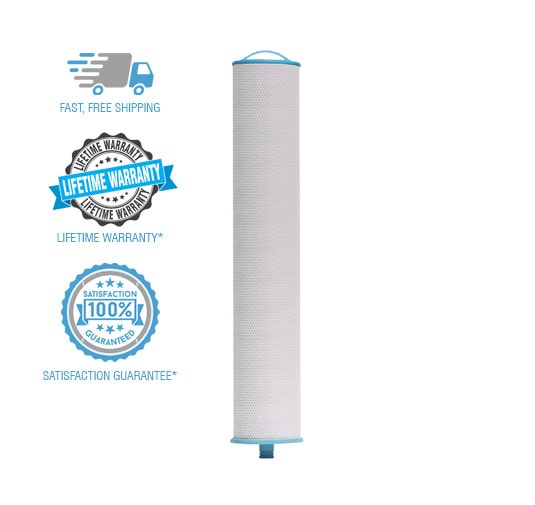 Replacement Filter - Lead & Cyst System
Replacement Filter - Lead & Cyst System 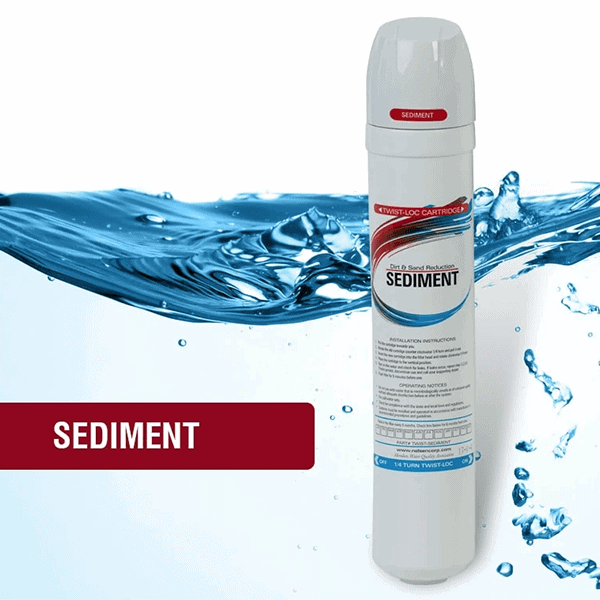 Replacement Filter - Reverse Osmosis - Sediment
Replacement Filter - Reverse Osmosis - Sediment 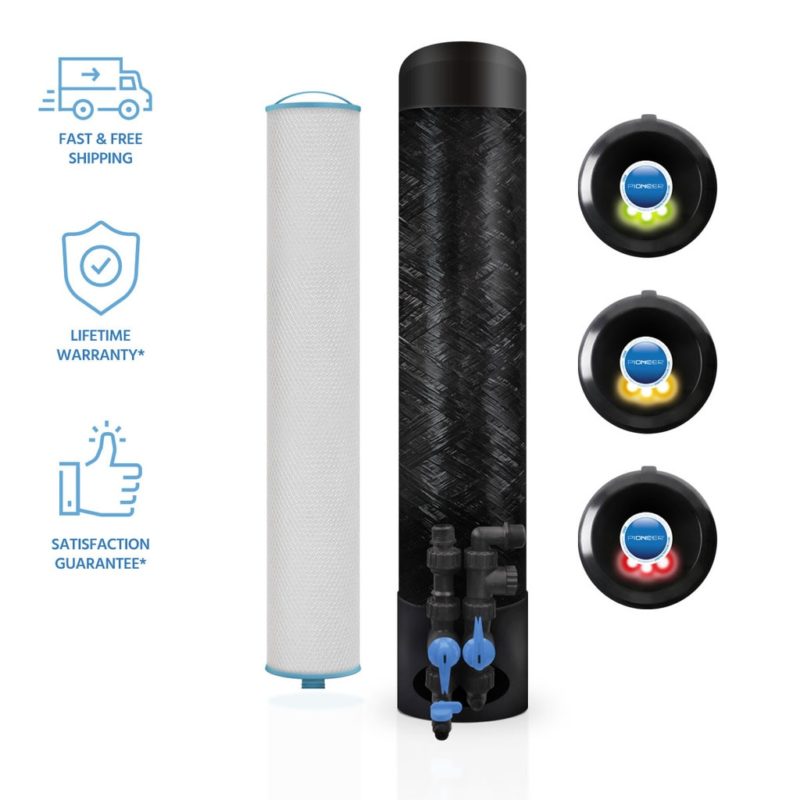 Whole House Lead & Cyst Removal System
Whole House Lead & Cyst Removal System 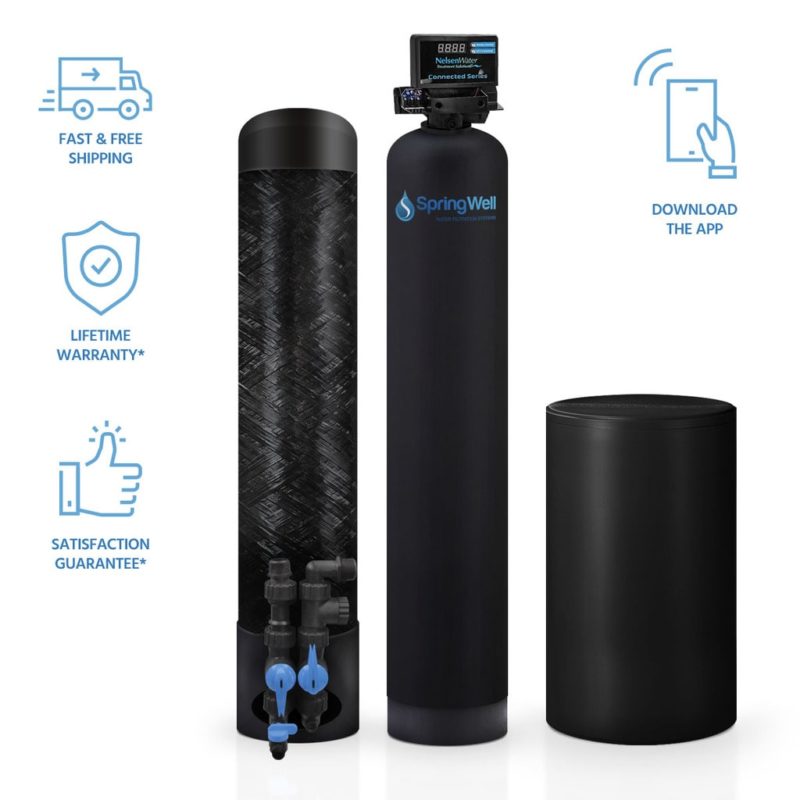 Whole House Lead & Cyst Removal System with Salt Based Softener
Whole House Lead & Cyst Removal System with Salt Based Softener 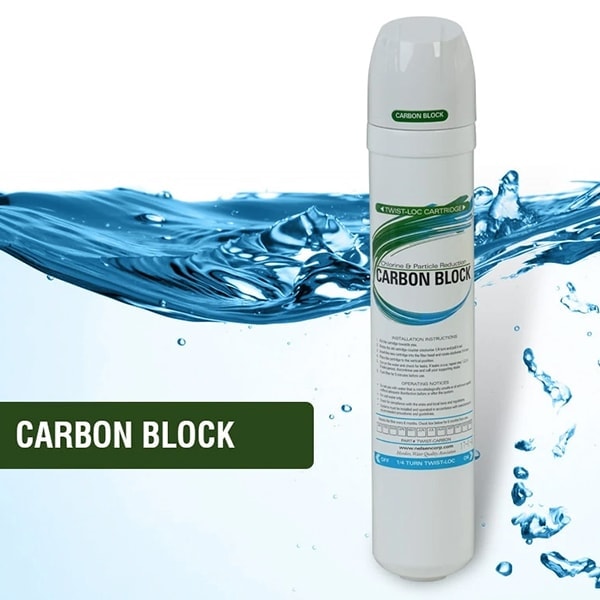 Replacement Filter - Reverse Osmosis - Carbon Block
Replacement Filter - Reverse Osmosis - Carbon Block 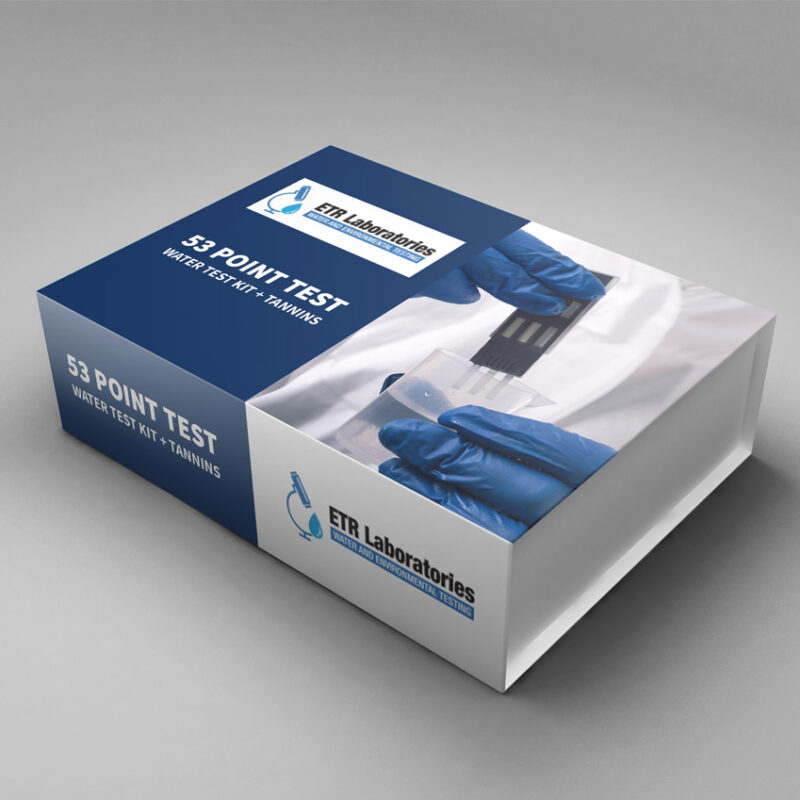 Water Test Kit + Tannins
Water Test Kit + Tannins 

